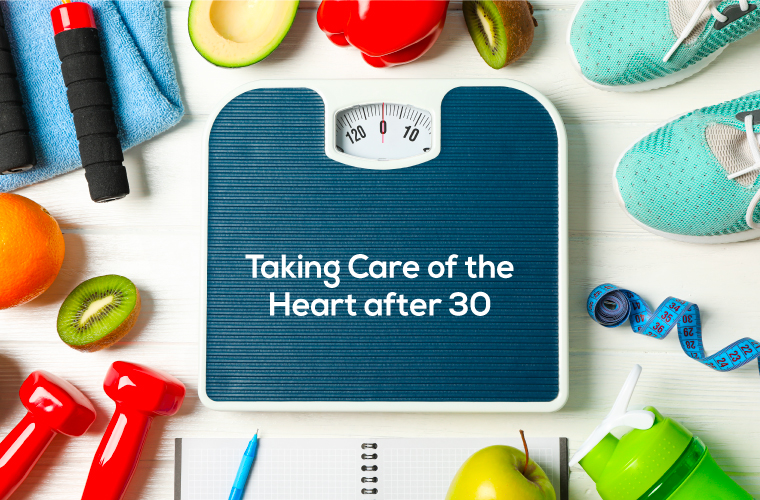Conventionally, heart diseases have been associated with old age when your bodily functions start losing their efficiency. However, we’re now witnessing the onset of heart and cardiovascular diseases in populations even in their 20s and 30s.
According to a 2018 study in the AHA journal, 30% of heart attack patients belonged to the age group of 35 – 54 years [1].
After the age of 30, our body starts to respond differently, and body production and absorption capacity of key nutrients start declining. Our overworked, stressful lifestyle and environmental changes over the past few years have increased the risk further.
Taking care of our heart calls for lifestyle changes. Here are 7 steps that you can take today towards a healthier heart tomorrow –
1. Take annual check-ups
Prevention is not only better but the best cure for heart diseases. Go for a routine check-up at least once a year.
Early detection of probable heart diseases would allow for taking necessary steps to curb the growth of the disease.
Gift yourself a full check-up every year. Take the following tests to measure your heart health –
- Blood pressure
Checks the blood pressure levels in the blood vessels. Normal range is 120mmHg (Systolic) /80 mmHg (Diastolic). A systolic reading of more than 140 mmHg marks stage 1 of Hypertension. - Lipid Profile
Checks the level of cholesterol in your blood vessels. The optimum range of cholesterol is – LDL or ‘bad’ cholesterol less than 130 mg/dL and HDL or ‘good’ cholesterol more than 60 mg/dL. - Glucose Levels
Monitors blood sugar levels. Fasting blood sugar level above 126 mg/dL is a sign of elevated sugar levels.
- ECG Test
Checks heart rhythm for normal heart functioning.
2. Exercise Regularly
Physical exercise is important to keep our bodies healthy, active and increase the quality of life. A sedentary lifestyle, with no physical activity, reduces metabolism rate and can increase the risk of cardiovascular diseases and other conditions.
Undertaking any form of physical activity – brisk walking, running, Yoga, fitness exercises, gym or intense exercises has the potential to regulate the heart muscle function, enhance metabolism rate and an overall healthy and active lifestyle.
Studies have shown that physical exercise can strengthen heart muscles. It can also help in increasing the level of HDL (the good cholesterol) that reduces the risk of heart disease.
At least 150 minutes of moderate – intense activity per week is recommended for adults.
3. Diet Changes
Diet has a major impact on heart health. The right nutrition and lifestyle can reduce the risk of heart, cardiovascular diseases, and stroke.
Diet can also reduce the risk of conditions such as high cholesterol, high blood pressure, and obesity which may often lead to heart diseases.
What not to eat?
- High Salt Food
Avoid foods loaded with a high amount of sodium salts. Watch out for pre-packaged foods, canned foods, and processed foods. They generally have a high amount of salt in them - Saturated and Trans fat
While there is an ongoing debate on the role of saturated fats in heart conditions, trans fats are a strict no. Check the labels and avoid food with trans or saturated fat in them. This includes vegetable oils, deep-fried foods, potato chips, cookies, crackers, and popcorn. - High Sugar food
Sweetened drinks, sweets, and snacks are major sources of high sugar content. Especially look out for artificially sweetened drinks and food items.
What to eat?
- Choose Good Fats
Not all fats are bad for your heart. Monounsaturated and polyunsaturated acids are not only beneficial but are essential for the body as well. Omega-3 is one such essential fatty acid. Several studies have established the benefits of Omega-3. Fishes such as salmon, sardines, mackerel are good sources of Omega-3. Use healthy fats such as canola or olive oil for cooking. - Eat Fruits & Vegetables
Good sources of antioxidants, fiber, vitamins, and proteins. - Nuts & Seeds
Good sources of fiber and micronutrients such as magnesium, copper, and manganese. Nuts such as Walnut and seeds such as Flaxseed, Chia Seed are excellent vegetarian sources of Omega-3. - Low Fat Products
Go for low fat or fat-free dairy products.
4. Watch your salt intake
Salt intake has a direct impact on blood pressure. Salt allows the retention of water in the body. An increase in sodium levels in the body makes it difficult for the kidneys to remove the excess water thereby increasing the blood pressure.
High blood pressure puts a strain on your heart and therefore can result in multiple heart related problems. Multiple studies have shown that making dietary changes and reduced salt intake can help in controlling and preventing high BP [2].
Consume salt in moderation and avoid salty foods to enhance the health heart
5. Kick the bad habits
Smoking and excessive alcohol consumption are one of the most preventable causes of cardiovascular diseases. Alcohol and tobacco can affect the functioning of the heart and increase the risk of a heart attack [3]
A cigarette contains 1000+ chemical substances apart from nicotine which poses risk to not only your lungs but to your heart and arteries as well. Studies have shown that smoking increases the risk of stroke, atherosclerosis (plaque build-up in blood vessels), affect the cholesterol levels in the body, and can cause irregular heart rhythms. All of this causes your heart to work harder and thereby increasing the risk of heart failure.
There is no safe limit of smoking per day.
The research on the effects of alcohol on our heart is still ongoing, however, the key term is moderation. While alcohol consumption in moderation may or may not help our heart but excessive alcohol is linked with an increased risk of high blood pressure, stroke and heart diseases. Until further research conclusively establishes the benefits, it best either to stay clear or consume alcohol in moderate amounts.
6. Maintain a healthy weight
Obesity puts additional strain on our bones, joints, liver, heart and poses risks to our health. It increases your chances of heart disease and can also put you at risk of a stroke.
Being overweight means our body needs more blood to supply oxygen and nutrients. Therefore, the heart must do additional work to push the blood. This can contribute to higher blood pressure which over time can cause weakening of heart muscles.
Obesity coupled with a lack of physical activity also increases the risks of diabetes, high cholesterol, heart stroke, and other cardiovascular diseases.
Eat right, exercise regularly and keep that weight in check for a healthy heart.
7. De-Stress
Stress has crept up into every aspect of our life and is turning out to be one of the biggest factors for early age cardiovascular diseases.
Stressful jobs, family problems, prolonged injuries, peer pressure have been regular stressors in our life. But now, there’s a new element that causes high levels of psychological stress – social media.
Expectations of living up to perfect life on social media are quickly driving youngsters to a higher level of stress. Recent research by Karabuk University Faculty of Business in 2017 has shown an increase in stress and anxiety levels among students because of social media [4]. However, the research is still ongoing and in a nascent phase in this field.
Stress is a natural body response to prepare our body for ‘fight or flight’ scenarios. Various physiological changes take place simultaneously to avoid the upcoming danger. Our muscles get flexed up, our heart beats faster than normal to push more blood to arteries, muscles, and vital organs, blood pressure increases, more fat, and glucose is converted to release energy and so on.
Chronic stress can leave our body in a perpetual agitated state where each bodily function is working in a hyperdrive.
Chronic stress can exacerbate breathing issues, cause increased heart rate, increase risk of high blood pressure, irregular heart rhythm, heart attack.
Several beneficial stress management strategies can be employed to counter the effects of stress –
- Eat Right. As simple as it sounds it is important to eat and avoid stress eating as well.
- Engage in regular physical exercise. A bit of physical activity each day can bring down your stress levels
- Get enough sleep. Give yourself an adequate amount of rest and sleep allowing your body to rejuvenate and repair the damage.
- Switch off. Turn off your digital life once in a while and engage in your hobbies.
- Seek out social support. Spend time with your family and friends.
- Seek a psychologist. If stress is shadowing your entire life, seek treatment with a psychologist or other mental health professional.
In Conclusion…
The heart is one of the most important organs of the body – keep it healthy to enjoy all the little things of your life.
Taking care of heart requires only slight lifestyle changes – eat right, be physically active, de-stress yourself and get regular checkups.
Sources:
[1] https://www.ahajournals.org/doi/full/10.1161/CIRCULATIONAHA.118.037137
[2] https://www.ahajournals.org/doi/full/10.1161/HYPERTENSIONAHA.117.09928
[3] https://pubs.niaaa.nih.gov/publications/arh293/199-202.htm
[4] https://www.ncbi.nlm.nih.gov/pmc/articles/PMC2633295/













